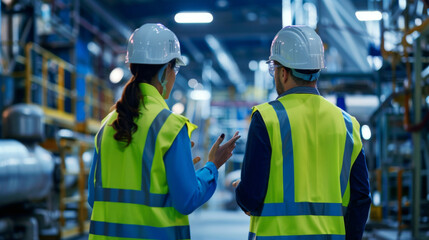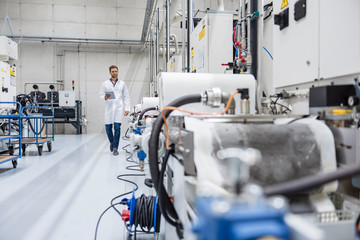The manufacturing industry has undergone several transformative changes over the past few decades, but nothing has had as profound an impact as artificial intelligence (AI). In an era marked by rapid technological advancements, AI has emerged as a key driver of innovation, efficiency, and productivity in manufacturing companies. From automating mundane tasks to enhancing decision-making processes, AI is reshaping the landscape of manufacturing in ways that were once the stuff of science fiction. This article delves into the role of AI in manufacturing companies, exploring its benefits, challenges, and the future it promises.
The Role of AI in Manufacturing
AI’s integration into manufacturing processes is revolutionizing how companies operate. Traditionally, manufacturing has relied heavily on human labor and mechanical processes. However, with AI, manufacturing companies can now optimize every aspect of their operations. AI algorithms can analyze vast amounts of data in real-time, enabling predictive maintenance, quality control, and supply chain management. This not only reduces downtime but also ensures that production processes are more efficient and cost-effective.
For instance, predictive maintenance powered by AI can foresee equipment failures before they happen, allowing companies to address issues proactively rather than reactively. This shift from preventive to predictive maintenance can save companies significant amounts of money and reduce the risk of unexpected downtime, which can be costly in terms of both time and resources.
Enhancing Product Quality with AI
Quality control is a critical aspect of manufacturing, and AI is making it more precise and reliable. In traditional manufacturing, quality control processes often involve manual inspections, which are time-consuming and prone to human error. AI, however, can automate these processes using machine learning algorithms that detect defects with greater accuracy and speed.
AI systems can analyze products on the assembly line, identifying even the slightest deviations from the desired quality standards. This level of precision is particularly important in industries where small defects can lead to significant issues down the line, such as in the automotive or electronics sectors. By ensuring that only products meeting the highest quality standards make it to the market, AI helps companies maintain their reputation and customer satisfaction.
Streamlining Supply Chain Management
Supply chain management is another area where AI is making significant inroads. Manufacturing companies often struggle with the complexities of managing their supply chains, from sourcing raw materials to delivering finished products to customers. AI can optimize these processes by analyzing data from various sources to predict demand, manage inventory, and coordinate logistics.
AI-powered systems can forecast demand with remarkable accuracy, helping companies avoid overproduction or underproduction. This not only reduces waste but also ensures that customers receive their products on time. Additionally, AI can optimize inventory levels, reducing the costs associated with storing excess materials or running out of stock.
Moreover, AI can enhance collaboration between different parts of the supply chain by providing real-time visibility into operations. This allows companies to respond quickly to changes in demand or supply, making their supply chains more resilient and adaptable to disruptions.
AI-Powered Robotics in Manufacturing
One of the most visible applications of AI in manufacturing is in robotics. AI-powered robots are becoming increasingly common on factory floors, where they perform tasks ranging from assembling products to packaging them for shipment. These robots are not only faster and more precise than their human counterparts, but they can also operate 24/7 without the need for breaks.
AI-powered robots are particularly useful in performing repetitive tasks that are prone to human error. For example, in the automotive industry, robots can assemble car parts with a level of precision that is difficult for humans to achieve consistently. This reduces the risk of defects and ensures that products are assembled to exact specifications.
Moreover, AI-powered robots can learn and adapt to new tasks over time. This flexibility is crucial in modern manufacturing environments where product lines often need to be reconfigured to meet changing market demands. By using AI-powered robots, manufacturing companies can increase their agility and responsiveness, staying ahead of the competition.
The Challenges of Implementing AI in Manufacturing
While the benefits of AI in manufacturing are undeniable, the journey toward full AI integration is not without its challenges. One of the primary obstacles is the high cost of implementing AI technologies. Developing and deploying AI systems requires significant investment in hardware, software, and training. For small and medium-sized manufacturing companies, these costs can be prohibitive.
Another challenge is the need for a skilled workforce. AI technologies are complex, and their successful implementation requires employees with expertise in data science, machine learning, and AI. Many manufacturing companies struggle to find and retain talent with these specialized skills, which can hinder their ability to fully leverage AI’s potential.
Moreover, there are concerns about the impact of AI on the workforce. As AI-powered automation becomes more prevalent, there is a growing fear that it could lead to job losses, particularly in roles that involve repetitive or manual tasks. Manufacturing companies must navigate these challenges carefully, ensuring that they invest in reskilling and upskilling their employees to prepare them for the new roles that AI will create.
The Future of AI in Manufacturing
The future of AI in manufacturing is both exciting and uncertain. As AI technologies continue to evolve, they will unlock new possibilities for innovation and efficiency. For example, AI could enable fully autonomous factories where machines communicate with each other and make decisions without human intervention. This could revolutionize the manufacturing industry, making it more efficient, flexible, and responsive to market demands.
However, the path to this future is not without its hurdles. Manufacturing companies will need to continue investing in AI research and development, as well as in the training and development of their workforce. They will also need to address the ethical and societal implications of AI, ensuring that the benefits of AI are shared broadly and that the risks are managed responsibly.
Conclusion
AI is transforming the manufacturing industry in profound ways. From enhancing product quality to streamlining supply chains, AI is enabling manufacturing companies to operate more efficiently and effectively than ever before. However, the journey toward full AI integration is not without its challenges, and companies must navigate these carefully to unlock the full potential of AI. As we look to the future, it is clear that AI will continue to play a pivotal role in shaping the manufacturing industry, driving innovation, and creating new opportunities for growth.
FAQs
Q: What are the main benefits of using AI in manufacturing companies?
A: The main benefits include improved efficiency, enhanced product quality, reduced downtime through predictive maintenance, optimized supply chain management, and the ability to automate repetitive tasks with precision.
Q: How does AI improve quality control in manufacturing?
A: AI improves quality control by using machine learning algorithms to detect defects with greater accuracy and speed, ensuring that only products meeting the highest standards make it to the market.
Q: What challenges do manufacturing companies face when implementing AI?
A: Challenges include the high cost of AI implementation, the need for a skilled workforce, and concerns about job displacement due to increased automation.
Q: How can AI impact the workforce in manufacturing companies?
A: AI can lead to job displacement in roles involving repetitive tasks, but it also creates new opportunities for jobs requiring skills in data science, machine learning, and AI management. Companies need to focus on reskilling and upskilling their employees.
Q: What is the future of AI in manufacturing?
A: The future of AI in manufacturing includes the potential for fully autonomous factories, increased efficiency, and greater flexibility in production. However, it also requires ongoing investment in technology and workforce development, as well as addressing ethical considerations.













